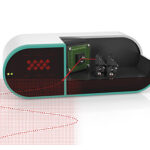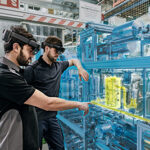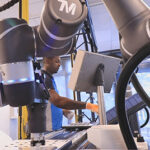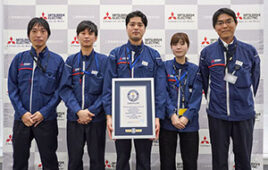 Algae are small climate savers. Even in their natural state they are extremely efficient photosynthesizers and absorb ten times more carbon dioxide (CO₂) than land plants. In bioreactors equipped with appropriate sensors, control technology and automation, the efficiency of algae can be increased to a hundred times that of land plants. This shows that they have a significant potential for a climate-neutral circular economy. With the PhotoBionicCell research project we are demonstrating a potential approach for industrial biologization in the future.
Algae are small climate savers. Even in their natural state they are extremely efficient photosynthesizers and absorb ten times more carbon dioxide (CO₂) than land plants. In bioreactors equipped with appropriate sensors, control technology and automation, the efficiency of algae can be increased to a hundred times that of land plants. This shows that they have a significant potential for a climate-neutral circular economy. With the PhotoBionicCell research project we are demonstrating a potential approach for industrial biologization in the future.
Algae can be automatically cultivated and their growth controlled with the bioreactor. The algae liquid is pumped upwards into the surface collectors where it is distributed in an even flow and then flows back to the cultivator. During this circulation, the algae cells, through photosynthesis in their chloroplasts, convert sunlight, carbon dioxide and water into oxygen and chemical energy carriers or organic recyclable materials. That is how biomass is cultivated in a closed cycle, which is highly efficient and conserves resources.
Efficient photosynthesis in the high-tech bioreactor
The combination of tried-and-tested open- and closed-loop control systems with state-of-the-art automation components provide the best possible conditions for the microorganisms. An integrated gassing concept ensures that the carbon dioxide from the air is evenly distributed into the circulating biofluid.
A major challenge for bioreactors is how to precisely determine the volume of biomass. Our developers are using a quantum technology sensor supplied by the start-up Q.ANT to do this. It returns accurate information on the growth of the organisms in real time. Using microfluidics, the algae are automatically and continuously pumped past the sensor from Festo. The quantum sensor isable to optically detect individual cells so that the amount of biomasscan be determined exactly. In addition, it examines the cells for their vitality. Only then is it possible to react to process events in advance and to regulate them.
Biological recyclable materials for climate-neutral end products
Depending on the nutrients fed to the algae biomass, the products that are formed as part of the metabolic processes are fatty acids, colour pigments and surfactants. They can be used as the starting materials for the production of medicines, foodstuffs, plastics, cosmetics or fuels. Unlike petroleum-based products, biologically based end products can usually be biodegraded and, in keeping with an overall circular economy, recycled in a climate-neutral process.
Our researchers have also focused on the cultivation of the blue-green algae in their work for the PhotoBionicCell. They are producing colour pigments, omega-3 fatty acids and polyhydroxybutyrate (PHB). By adding other substances, the resulting PHB can be processed into a filament for 3D printing. Complex forms of sustainable plastic components or packaging can be manufactured in a short time with this modern production technology. For example, specific fastening clips made of bioplastic are installed in the PhotoBionicCell.
Software solutions for a digitised laboratory
Many laboratory analyses have been done manually up to now. This is slow and can result in errors. The automation of such laboratory systems in the future will enable all required data to be read directly and in real time and researchers can concentrate better on their core tasks.
PhotoBionicCell will be completed by using in-house developed software. The dashboard allows multiple photobioreactors to be displayed with the current data situation and live images. Changes to parameters and the corresponding evaluations can be made around the clock and remotely. Users can thus respond to changes in the bioreactor at any time and, for example, start harvesting the product at the optimum time.
The digitised laboratory will be enhanced by an augmented reality application. A tablet can be used to augment reality and visualise the technical processes, process parameters and information about the processes inside the bioreactor.
Artificial Intelligence and digital twins
Our developers are also using artificial intelligence (AI) to evaluate the data. This allows the bioreactor to be optimised for the propagation of the algae cultures or to maintain specified growth parameters with minimal energy input. It could also be used to forecast the service life of valves and other components. The use of digital twins created with the help of AI would also be possible. They could be used in future to simulate complete lifecycles of bioreactors and to show virtual images. The expected cell growth of different microorganisms could also be estimated with great accuracy before the physical setup up of a real system.
Automated dispensing as basis
In addition to optimising laboratory facilities with automation and digitalisation, so-called artificial photosynthesis offers another promising perspective for cultivating biomass even more efficiently. With the Max Planck Institute for Terrestrial Microbiology Marburg as our partner, we have developed an automatic dispenser to improve the individual enzymes of photosynthesis. This requires testing thousands of variants of an enzyme. Compared to manual pipetting, the new automatic dispenser works much faster and eliminates errors. In addition, the automatic machine can be adapted to new tasks in seconds.
Synthetic biology for maximum efficiency
However, it’s not just the individual building blocks of photosynthesis that can be optimised. The scientists are working on the digital optimisation of complete metabolic paths. This approach is referred to as synthetic biology. A metabolic path optimised on the computer is packed in synthetically manufactured cells, referred to as droplets. They have a diameter of around 90 micrometres and contain all the required enzymes and biocatalysts. This enables them, like their biological models, to absorb carbon dioxide using light energy.
Even though we are still in the middle of the development process, the potential for the future is already becoming clear today. If expertise in automation and basic research come together, the road to carbon-neutral production on an industrial scale will be implemented much faster. That is why we are conducting research in the field of biologisation.
Festo
www.festo.com
You may also like:
Filed Under: NEWS • PROFILES • EDITORIALS








